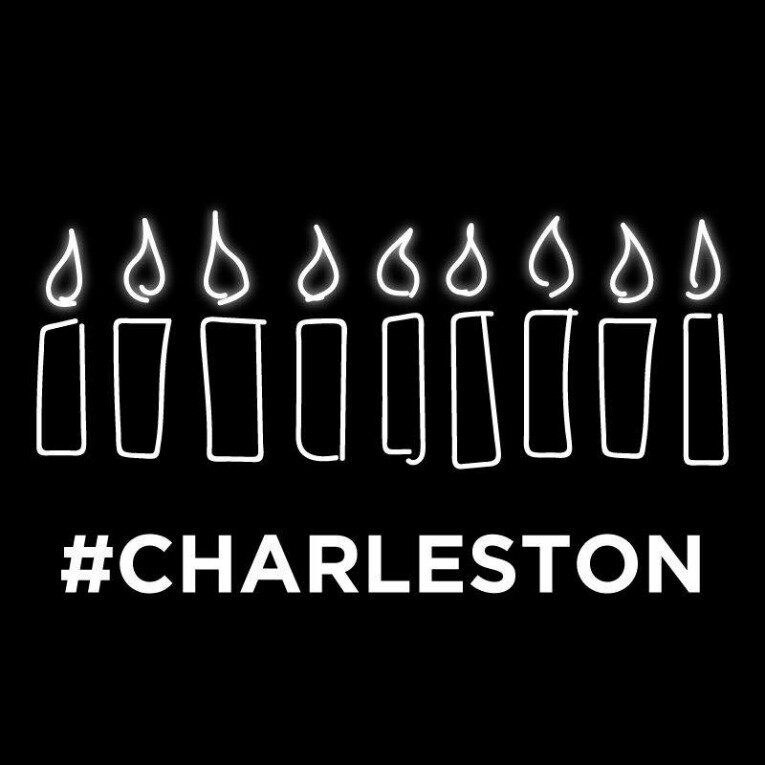On Wednesday, June 17th, nine Black people were killed by a white gunman in the Emanuel African Methodist Episcopal Church in Charleston, South Carolina.
We want to remember the victims here:
Cynthia Hurd, 54
Reverend Clementa Pinckney, 41
Reverend Sharonda Coleman-Singleton, 45
Tywanza Sanders, 26
Ethel Lance, 70
Reverend Depayne Middleton-Doctor, 49
Susie Jackson, 87
Rev Daniel Simmons Sr, 74
Myra Thompson, 59
This attack comes amidst the growth of the national #BlackLivesMatter movement, which in part serves to remember, honor, and fight for the victims of racist police violence and anti-Blackness across the country: Michelle Cusseaux, Tanisha Anderson, Rekia Boyd, Kalief Browder, Michael Brown, Eric Garner, Freddie Gray, and countless others. In Charleston, nine more Black lives were cut short by racist violence. It is particularly important to recognize that six of the nine were Black women #SayHerName.
The shooting was not simply an attack on these individual Black lives. Emanuel AME is a symbol of Black resistance. The church has historically been a site of the Black community coming together in the face of anti-Black violence in South Carolina. Even as we mourn the loss of these lives, we must celebrate the places that have supported the continued struggle for Black liberation. We can begin by donating to the Church fund here: www.bidr.co/prayforcharleston.
This shooting echoes the many instances of white terrorism throughout U.S. history in which extreme violence has been inflicted upon places of worship in Black communities. In 1963, KKK members bombed a Baptist Church in Birmingham, Alabama, killing four Black girls. Today, we are reminded of Martin Luther King Jr.’s words from the eulogy following the bombing:
“[The victims] say to each of us, Black and white alike, that we must substitute courage for caution. They say to us that we must be concerned not merely about who murdered them, but about the system, the way of life, the philosophy which produced the murderers.”
We know that the shooter’s racist actions are not a matter of isolated extremism, but are a result of a nation that has comfortably harbored white supremacy and discarded Black lives. Failing to acknowledge this painful truth does a disservice to the people who lost their lives and to our continued struggle for justice.
As organizers with the Fossil Fuel Divestment Student Network we are partners in building a youth-led movement for climate and economic justice. Central to this work is an understanding that Black communities sit at the frontlines of poverty and pollution. Our struggle for climate and economic justice will only come forth when we insist upon a commitment to Black liberation in all that we do.
As Gopal Dayaneni from Movement Generation Justice & Ecology Project said,
“In the US and around the world, everything is used as a weapon of war against Black folks.
It’s where we put polluting facilities.
It’s who gets liquor stores instead of grocery stores, or even land to grow and control food.
It’s who gets substandard housing. Who gets predatory mortgages. Who gets evicted.
It’s about who gets crappy voting machines and who gets voter suppression.
And it’s about who gets shot with the guns that we pay for.
The path to everything we need in this world – the path to climate justice, to food justice, to democracy – travels through
Black liberation. So when Black lives matter, all lives will matter.”
Racism and environmental injustice do not act as independent systems nor as separate forces; white supremacy, patriarchy, and capitalism work with one another to perpetuate cycles of violence. These oppressive systems must be addressed together as we fight for divestment from fossil fuels on our college campuses and in the broader climate justice movement.
We join the collective call to remember and honor the lives lost in the AME shooting. To the friends and families of those whose lives were taken: Our hearts are with you. May they rest in power and in peace.
We make this statement in solidarity with the Charleston community and as a call to action to our more immediate networks of young people organizing for fossil fuel divestment and climate justice. We will renew our commitment to building collective power for justice, with an intent to center Black liberation in our work. We encourage DSN organizers on campuses to join us, show up for #BlackLivesMatter and #SayHerName organizing in your area, donate to the fund, and directly participate in any solidarity efforts.

